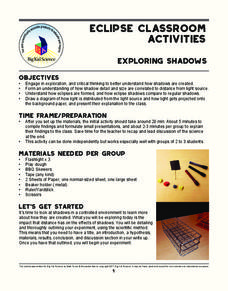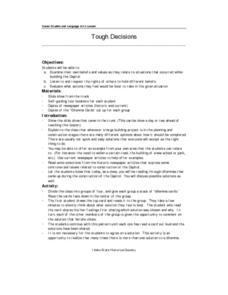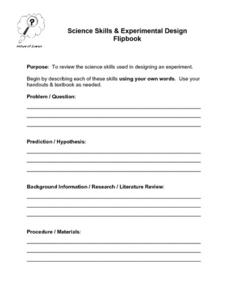Teach Engineering
Flow Rates of Faucets and Rivers
Go with the flow and use a helpful resource. A set of two activities has learners investigate flow rates. They first determine the flow rate of a faucet by measuring how long it takes to fill a bucket. Using the results, they make a...
Chicago Botanic Garden
What Can Tree Rings Tell Us About Climate?
Tree rings are slightly thicker on the south side of the tree because it receives more sunlight. Part two in a series of five lessons helps learners analyze tree rings to determine the environmental conditions that caused size...
Chicago Botanic Garden
Are All Plants Created Equal?
Photosynthesis requires energy and produces food, and cellular respiration produces energy and requires food. An interesting activity analyzes the factors that affect the rates of photosynthesis and respiration. Classes spend one day...
Big Kid Science
Exploring Shadows
What's that lurking in the shadows? An activity that demonstrates how eclipses happen. Science scholars investigate how light and distance interact to form shadows. The experiment uses simple materials to generate data and observations...
Howard Hughes Medical Institute
Seed Dispersal in Tropical Forests
How do seeds get around? It's not like plants can control seed dispersal—or can they? Dig deeper into the amazing mechanisms of seed dispersal observed in tropical plants through interactives, a video, and plenty of hands-on data...
American Psychological Association
Do Cookies/Donuts Improve Memory? Errors in Methodology
If the methodology is skewed, the results will be skewed. That's the takeaway from an exercise designed to get class members thinking about research methods and statistics gathering. Instructors manipulate the testing environment to...
Serendip
Where Does a Plant's Mass Come From?
Where does the mass for a growing tree come from? Scholars consider a few different hypotheses and guess which is correct. They then analyze data from different experiments to understand which concepts science supports.
Curated OER
Correlating Atmospheric Data Lesson Plan
Students make and test hypotheses about atmospheric data collected aboard the NOAA ship Ronald H. Brown research cruise.
Curated OER
Point of View and Scientific Truth
Learners investigate the mystery of the "destructive force." They explore the concepts of natural phenomena. Students discuss the limited aspects of natural phenomena and the "whole truth" to generate new hypotheses that can be tested.
Curated OER
Particulate Observation
Students examine samples of common dust from their homes and school under a microscope. Students describe their samples including the location from where they were collected, and compare their samples to make hypotheses about their...
Curated OER
Designing a Scientific Study
Students define an exploration question or hypothesis and design a scientific study to answer it. They conduct the experiment.
Curated OER
Tough Decisions
Students research a complex question. They work together to form hypothesis and research the question and analyze the data. They present their "decision" to the class based on their work.
Curated OER
Porosity
Students investigate the concept of an aquifer and use a 2 liter bottle and other materials to conduct a simple lab experiment or demonstration. They calculate the volume of water that can be stored in the aquifer. The lab is used to...
Curated OER
Statistical Analysis
In this statistics worksheet, students analyze the data provided in order to determine the null hypothesis, an alternate hypothesis, and the significant difference between the groups. The one page worksheet contains three scenarios with...
Curated OER
Fortune Teller Fish
Middle schoolers demonstrate how to create and test a hypothesis. They design an experiment and set up a variable, experimental group and control group.
Curated OER
What is a P-value?
Young scholars test the hypotheses using p values. In this statistics lesson, students define and examine conditional probability. They test each statement for a true statement or a false statement, based on the sample size.
Curated OER
Popcorn!
Second graders pop popcorn as a way to experience the scientific process. They form a hypothesis, carry out an experiment and explain their findings.
Curated OER
Investigating the Biosphere With Planetary Models
Students create a biosphere using the computer program SImEarth. They work in small groups to create "Daisyworld" in which they model aspects of the Gaia hypothesis. They form a question to answer and choose variables to investigate in...
Curated OER
Capillary Action and Adhesion
Learners perform classroom experiments to observe adhesion. They perform a second experiment using sand, salt, water, and a heat lamp to observe the principle of capillary action. They also experiment with adhesion in plants.
Curated OER
How to Make a Lake
Students examine the Michigan state quarter and discuss the effects glaciers have on land formation. They perform an investigate using ice cubes and sand to show how glaciers have carved the land.
Curated OER
What Caused the Water to Rise?
Learners investigate a scientific phenomena. In this scientific investigation lesson plan, students hypothesize why water rises around a lit candle sitting in a pie tin of water as it is covered. They reflect on questions raised during...
Curated OER
Mystery Boxes
In this observations worksheet, students are given a box with unknown items inside. They are to experiment with the box and determine what is inside by shaking, rattling and rolling the box. They write down an educated guess for six items.
Curated OER
Conducting a Scientific Investigation
In this scientific investigation worksheet, students answer 16 questions about conducting a scientific experiment on marble's and their velocity at different ramp heights. Students write a scientific question and then go through the...
Curated OER
Science Skills and Experimental Design
In this experimental design worksheet, students describe the different science skills required when designing an experiment. Then students create a flipbook with the information. This worksheet has 9 short answer questions.
Other popular searches
- Scientific Method Hypothesis
- Writing Hypothesis
- Gaia Hypothesis
- Making a Hypothesis
- Writing a Hypothesis
- Hypothesis Writing Labs
- Creating a Hypothesis
- Origin of Life Hypothesis
- Hypothesis Worksheets
- Practice Writing Hypothesis
- Hypothesis Generation
- Gaea Hypothesis

























